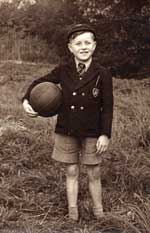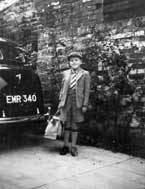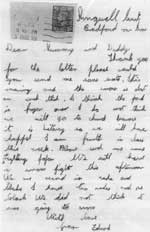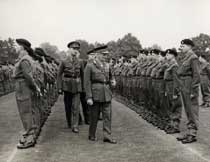



I
would have started I suppose at about four and a half. I went to what
now would
be called I suppose a Dame school. In fact it was virtually just a room
or a couple of rooms in the base of a flower mill. Which the business of
this flower yard went on around us really and then it moved out to one
or two prefabricated buildings on a site just on the edge of the town.
Which the buildings had been left over from the war and it had a bit of
rough ground with it and it was a very kind of pleasant experience really.
... I don’t suppose there were more than about twenty
or thirty children at the most.
It was a private school as opposed to being a state school.
I suppose it would have taken children on until the end of primary
school, because I certainly stayed there until he age of eight. I’m
not quite sure what happened to children after that whether they
went to Whether they stayed on longer or went somewhere else...
I can remember sitting in the classroom, learning about sheep farming
in Australia I don’t know why I can remember that but I can.
I can remember reading books. I can certainly, well I think I can remember
actually learning
to write though that may be in part because I’ve still got some
of my initial exercise books and they probably reminded me of it. We
used
to have little ex.. this was in the days of shortages and so on so
the exercise books were cut in half with a pair of scissors to make
two
little books which we then sat and copied out A’s B’s
and so on that was really the beginning of my schooling.
What about other children do you remember any friends there?
Yes. There was a mixture yes, I had boys and girls who were friends. We
went to each others house and had parties and so on and that was very much
part of the social scene I suppose most of the other children were kind
of what you might call middle class children or lower middle class children.
Sons and daughters of other traders or doctors or whatever in the town.
 And
going back to school where
did you go next?
And
going back to school where
did you go next?
Well,
I was sent away to school. My parents’ business was successful
I suppose you could say that the family was lower middle class
with pretensions of something
better really and they thought that to give me a private education was the
best thing they could do for me and One has to kind of admire them
for that really
and so at about the age of I think
about eight and a half I went away to boarding school in Bradford on Avon
to a school called Kingwell
Court which was quite a nice little school really quite.. a bit homesick
to begin with but I saw my parents about every three weeks I either
had a day out or a half term It’s surprising when you’re that age
how quickly you adapt to being a boarder at a school. Odd things
I can remember
like the first day there my, I had a new biro or ballpoint pen as you
call
them now I suppose which my parents had given to me as a present to
take away
to school with me and it was confiscated on the grounds that ballpoint
pens were bad for your handwriting and You had to write with a fountain
pen and therefore from then onwards I had to write with a fountain
pen and did for many years really.
I
remember my first teacher was a young woman called Miss Watson who
I was very fond of and thought was a great teacher and I think I
got quite upset when
she got married (laughing) to one of the other teachers. But the other teachers
were quite interesting because it was just after the war, so my geography teacher
had been a rear gunner in a Lancaster bomber which was very romantic and the
English I think and Latin teacher had been in the eight army in the desert
in North Africa and had a kind of faded face on his watch to show how
long he’d
been in the sun. The Maths master who was a very good maths master quite strict
|Mr Schegeloff was an émigré from Russia he’d come out of Russia so probably
as a result of the Russian Revolution and lived in Bradford-On Avon and taught
maths.
Quite successfully really One or two other odd characters The head teacher
changed while I was there and the new one had a tendency to go down into the
town and
be driven back by his wife rather the worse for wear and everybody in the dormitories
used to keep very quiet because we knew that if he heard any noise or anything
he’d come in rather angry and inebriated and beat you with a slipper so we
all kept very quiet when he came round. We had another English master who I
don’t
think was there that long but I understand or a remember being told had a metal
plate in his head probably another casualty from the war or something. But
he was really not totally sane and he used to sit and read us English grammar
books
in a kind of droning voice and then he’d look up, decide that we weren’t paying
attention and fling a board rubber, which was a sort of wooden thing with a
felt on it. He’d fling it and everyone would open the top of their desks in
order to shield themselves from this flying board rubber so that was a bit
interesting
but we kind of survived
Were they kind to you?
On the whole I would say yes. I never, I never remember being unhappy at school
at all... we played games all the time of course Probably
most afternoons, football, hockey , rugby, cricket in the Summer of course
and there were other activities and things so it was that’s
the way life was then . Lived in dormitories with iron bedsteads,which had
different colours. There was a sort of stripe painted round the wall of orange
or green or pink or something like that which was your dormitory they probably
held eight or ten or a dozen boys in each room. It was like a country house
really and so that was the way life was There was time to as I say make model
aeroplanes
drink the free milk and all the rest of the things that were part of the post-war
era ... We did have radio we used to listen to the radio particularly in the
evening. There was a programme, there was some kind of science fiction programme
something
like ‘journey into space’ I
think it was called something of that kind We listened to that avidly we probably
had occasional films too I think but listening certainly when we were able
to listen to the wireless as we should have called it then not the radio

I corresponded from very early on. My earliest letters are quite hilarious because they're..all my first letters from Kingwell from the age of about eight to my parents all manage to raise the issue of sweets in one form or another In like ‘my sweet ration seems to be getting a bit low, I wonder whether you could send me some more sweets?’ We did have sweets but they were rationed out. You know you had a few perhaps once a week or something I can’t exactly remember how it was done but they were kept in the cupboard and you were given your little share as a treat every week. I do actually remember sweets coming off ration because they were rationed .They were one of the last things to come off coming off ration after the war I do funnily enough remember that. Obviously a great event in my life, sweets coming off ration and becoming more freely available.
Life at Marlborough
And
when you went to your next school was that like starting afresh?
Well, the next school was Marlborough College and that was obviously
a much bigger school much more in a way more demanding I suppose you
had to kind of grow up
pretty quickly really and live with what was a much. well, a tougher regime It
wasn’t that hard really I mean I don’t want to give the impressionthat it was really cruel or anything it wasn’t but it did require getting
up and getting on with life There was wonderful punishments and things. There
was one punishment where they rang bells I think they were probably about three
minutes apart and at the first one you had to be in bed in your pyjamas and by
the second one you had to be fully dressed and reported to the prefect at the
other end of the dormitory and the snag was of course that we had separate collars
with collar studs and cufflinks and things so it was it did require quite a kind
of logistical effort to get yourself organised the night before to fulfil this
particular punishment. Another strange punishment was learning poetry it was
called repetition you had to learn a poem as a punishment and then kind of recite
it back. I still remember one of the poems I learnt was Coleridge’s in
Kubla Khan which funnily enough I was reading a book the other day that David
gave me and it was in it and remember the first lines of that to this day and
could recite it again well the first part of it because I learnt it as a punishment
all those years ago. Quite strange.
Going back to your sweet ration, did you have
a tuck box for school?
I didn’t have a tuck box at Kingwell Court but Marlborough we did we actually
had a tuck box which was a wooden box which you filled up hopefully if your parents
were nice with tins of baked beans and the odd cake which obviously didn’t
last very long and so on and then we actually had gas rings and you could go
and cook something and you could make toast in your study or whatever we had
studies when you got a bit older So you make toast and things of that kind, simple
meals if you got hungry but I mean I don’t remember doing it a lot obviously
you could have sweets and things there was a sweet shop in town you could go
and buy a few sweets, things like that.
So you were given some freedom to leave the school at some stage?
Well at certain times of day anyway. You could go out, lunchtimes you
could go out in the town yes and of course you could cycle wherever you
wanted there was,
yes there was quite a freedom there to get out I mean you were supposed to be,
obviously you only had a limited time you could only go so far in a particular
direction there was also the cadet force so that was you know we had the cadet
force activities.
Was that something that you could choose to do?
I don’t really remember whether there was any choice not to (laughing)
certainly everybody did belong to it You were you know kitted out with a first
world war uniform and a rifle and that was you know, that was what you did. It
had a naval section, an air force section and an army section and a band and
I was in the band the band was a slightly cushy number because if it got really
cold you sat round the band room and practiced because if you went out your instruments
froze so you had to sit round the fire in the band room which was definitely
the best thing to do Most of my cadet work was really playing in the band.
Did you do parades and marches?
Oh yes I did all that and we would beat the retreat in sort of formal ceremonies
and things like that. We
had our annual parade where we were inspected
the most famous one being by the inspection
by field Marshall Montgomery
which happened when I had just joined the cadet force I must have been
about fourteen or something I suppose I’ve got photos of me with
him looking at me somewhat quizzically and me with my belt askew. Not
looking terribly soldierly really so that was quite an event the kind
of event I remember really well. He talked to us all afterwards in the
school hall and he kind of said “the headmaster says you all have
a half day “ ( because we had half days off and everything) and
he said ‘well I’ve told him you’re to have a whole
day .He was really quite a character. I
remember that well. We used to have music concerts in the same hall sort
of pianists
and orchestras and things coming to play so the music side of it was
quite good really.
We
had our annual parade where we were inspected
the most famous one being by the inspection
by field Marshall Montgomery
which happened when I had just joined the cadet force I must have been
about fourteen or something I suppose I’ve got photos of me with
him looking at me somewhat quizzically and me with my belt askew. Not
looking terribly soldierly really so that was quite an event the kind
of event I remember really well. He talked to us all afterwards in the
school hall and he kind of said “the headmaster says you all have
a half day “ ( because we had half days off and everything) and
he said ‘well I’ve told him you’re to have a whole
day .He was really quite a character. I
remember that well. We used to have music concerts in the same hall sort
of pianists
and orchestras and things coming to play so the music side of it was
quite good really.
And what did you play in the band?
I played the euphonium and I played, later on learnt to play the trombone
I played the trombone as well. I played the trombone in the school orchestra.
We had a school orchestra and we had a kind of a military band which was
woodwind and brass and I played the euphonium in the military band and
that was good fun I really enjoyed that that’s when I really learnt
to play an instrument unfortunately I didn’t keep it up after I left
school but it was fun.